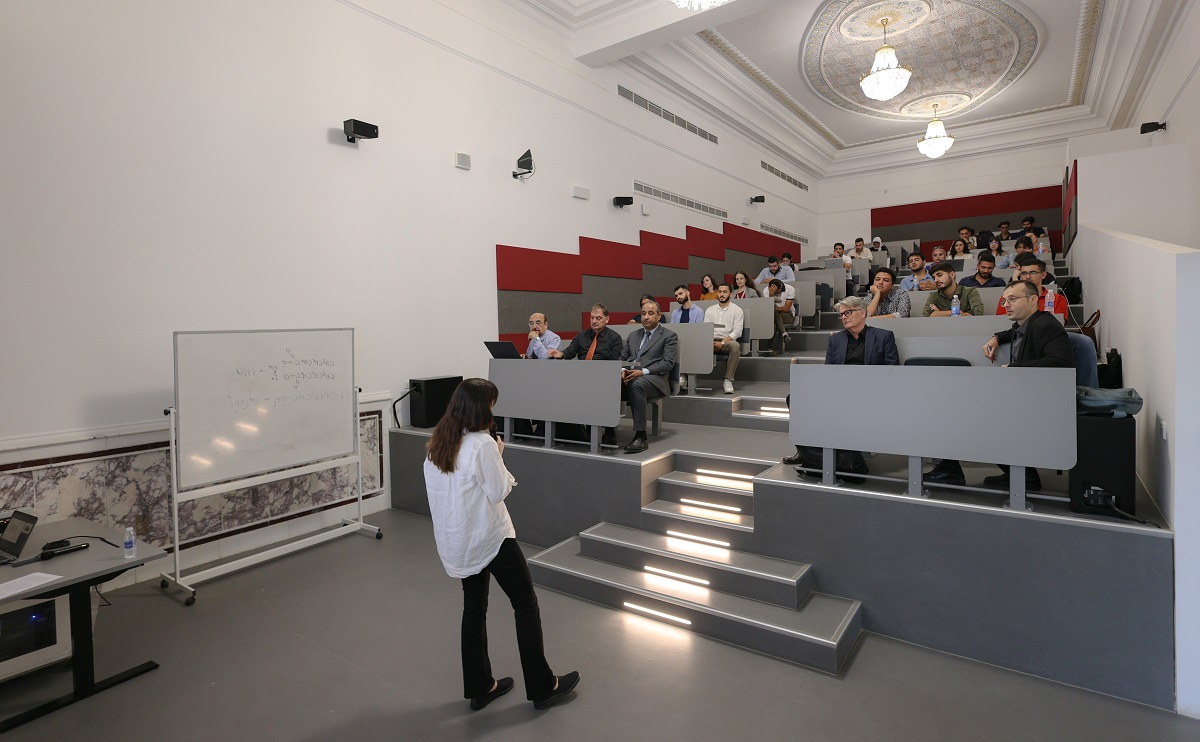AUIB Institutional Review Board (IRB)
A team of members sitting on a board that focuses on ethical concerns and dilemmas. Comprised of academics and professionals from various disciplines, such as healthcare, legal, and research, the IRB committee’s main purpose is to provide guidance and oversight regarding ethical practices. One of the primary roles of the ethics committee is to ensure that all policies, procedures, and actions align with ethical principles and standards. They review and address complex ethical issues that may arise in decision-making processes, research studies, patient care, and organizational practices. These ethical guidelines are supported by the Belmont Report, Declaration of Helsinki, and the Nuremberg Code.
To guarantee that the rights and welfare of human research participants are protected as required by national and international regulations, the IRB accepts, requests adjustments to, and rejects planned research. The IRB’s mission is to support AUIB researchers and affiliated researchers in their pursuit of knowledge while maximizing participant benefit and preserving the participants’ autonomy to provide informed consent.
IRB members

Dr. Hassan Nadhem
Senior Counselor for Cultural and Educational Affairs
Chair of IRB
Dr. Hassan Nadhem is the Senior Counselor for Cultural and Educational Affairs at the American University in Iraq – Baghdad, a former Iraqi Minister of Culture, Tourism, and Antiquities, a university professor, writer, and translator. He is the founding Chairholder of the UNESCO Chair for the Development of Interreligious Dialogue Studies in the Islamic World at the University of Kufa, the Editor-in-Chief of Kufa Review, and the Founding Director of ‘Intellectual Studies’ (a series of books published by the University of Kufa). Nadhem taught in several Western and Arab universities and institutions including the Islamic College for Advanced Studies ICAS-Middlesex University (London), Nasir University in Libya, Baghdad University, and Kufa University. He published twenty authored and translated books and numerous refereed articles. His current teaching and research activities mainly involve intercultural studies, hermeneutics, and critical theory. He is a co-founder of the Hani Fahs Award for Dialogue and Religious Pluralism, a judge in the Hamad Award for Translation and International Understanding, and a co-founder of the Center for Countering Hate Speech.

Dr. Achraf Al Faraj
Dean of College of Pharmacy
IRB member
He previously held several leadership academic positions at the universities of Lyon and Paris in France, King Saud University in Saudi Arabia, and the American University of Science and Technology in Beirut, Lebanon.
Prof. Achraf Al Faraj received two M.S. degrees and a PhD in Biomedical and Pharmaceutical Sciences and Engineering from the University of Lyon 1, France. He then performed his Post-Doctorate Research Fellowship at the University of Paris 7 and served as Consultant at the European Hospital Georges Pompidou.
His vision for the College of Pharmacy is to be recognized as a regional leader for outstanding pharmacy education and innovative practice and research, with the objectives of delivering outstanding patient care, improving public health, and advancing scientific knowledge.

Dr. Muslih Irwani
Prof. CIS
IRB member
Muslih Irwani Associate Professor of Social and Public Policy at the American University of Iraq – Baghdad. He obtained his PhD in Social Policy and Administration from the University of Nottingham – UK. His research interests cover social protection, governance and social policy, migration, displacement and social cohesion. He provides policy advice and consultancy in the areas of minorities, displacement, social protection and development. Irwani has taught at various universities including American University of Kurdistan in Duhok, Salahaddin University and the University of Kurdistan Hawlêr (in Erbil), and Nottingham University (in the UK). He is Co-Investigator on the Global Challenge Research Fund (GCRF) Gender, Justice and Security Hub funded by UKRI. He is also a Visiting Fellow at London School of Economics and Political Science (LSE).

Dr. Mizanur Rahaman
Prof. COL
IRB member
Dr. Mizanur Rahaman is currently an Associate Professor and Head of Dept. – Private Law at the College of Law, American University of Iraq-Baghdad (AUIB). Previously, he has taught at University of Kent (UK), at Wolaita Sodo University (Ethiopia), and at Jindal Global Law School (India), where he was Associate Professor and Associate Dean, and Associate Director at the Centre for Post-graduate Legal Studies (CPGLS). He was also the Managing Editor of the Journal of Information Law & Technology (now European Journal of Law & Technology), an e-journal published by the School of Law, University of Warwick.
He received his doctorate (PhD) in law from the University of Kent, UK in 2017. He also holds an LLM in International Development Law and Human Rights from the University of Warwick (UK); an LLM from University of Pune (India) and a Bachelor of Law (LLB) from University of Calcutta (India). Most recently, he was a Visiting Research Fellow at the Department of Law, European University Institute (EUI), Florence, Italy and a Scholar-in-Residence at Gujarat National Law University (GNLU), Gujarat, India. Besides presenting his research at conferences, he has written for a number of socio-legal and social science journals. His research interests include the intersection of intellectual property law, international trade and investment laws; human rights and legal pluralism; law and development; transnational legal theory.

Konstantinos Katsakioris
Prof. CAS
IRB member
Constantin Katsakioris holds a PhD in contemporary history from the École des Hautes Études en Sciences Sociales in Paris (EHESS, 2015). He was a junior researcher at the EHESS in the project “African Elites Educated in the former Socialist Bloc” (2012-2015), a lecturer and visiting professor at the universities of Leipzig and Bayreuth in Germany (2015-2020), and at the same time a member of the Bayreuth Academy of Advanced African Studies, a fellow of the German Orient Institute in Beirut, Lebanon (2019-2021), and a senior PRIMUS researcher and lecturer in the Institute of World History at Charles University in Prague (2021-2023). He is currently an Associate Professor of History at the American University of Iraq-Baghdad.

Dr. Jeffrey Bellows
Director MBA
IRB member
Widespread academic and NGO management experience across Asia, Africa, Europe, and North America including: Kenya, Iraq, Cambodia, Vietnam, Philippines, Malaysia, Singapore, Samoa, Mongolia, Ethiopia, Kyrgyzstan, Kazakhstan, Tajikistan, Georgia, Azerbaijan, Armenia, Rwanda, Burundi, Democratic Republic of the Congo, United States, Canada, Mexico, United Kingdom, Netherlands, Germany, Tanzania, Uganda, Malawi, South Sudan, Tunisia, Zambia, Sri Lanka. Launched two (2) MBA programs at different universities. Fourteen (14) years of university-level lecturing experience in business administration, management, organizational behaviour, leadership, and entrepreneurship classes. Voted most outstanding business lecturer for three (3) years by the 5,000+ student population. Widely known writer in the Business Daily newspaper on management, entrepreneurship, and leadership with over 520 articles. Extensive grant writing and grant management experience for research and programmatic grants. Brought eleven (11) research and programmatic grants to my university employer. Founded and managed an entrepreneurship incubation hub at the University. Vast executive leadership positions in corporate, non-profit, and education management across North America, Africa, Europe, Asia, Pacific, and Latin America.

Dr. Adil Ghidan
Prof. CAS
IRB member
Adil Al-Azzawi received his MS. in Computer Engineering in 2017, and his Ph.D. in Electrical Engineering and Computer Science in 2019 from University of Missouri-Columbia/USA. He earned his bachelor’s degree in software engineering from Al-Rafidain University/Iraq in 2001, his first master’s degree in software engineering in 2002, and second master’s degree in 2005 from the University of Technology/Iraq. His research is mainly focused on developing data-driven computational methods (particularly machine learning, deep learning, and computational optimization methods) for cryo-EM based protein structure modeling. In addition, he is interested in developing data mining methods to fully automate the Single Particle Analysis Framework (SPA).

Gerhard Fortwengel
Prof. Clinical Research
External IRB member
Prof. em Dr. Gerhard Fortwengel holds a diverse educational background that reflects a deep commitment to the field of health sciences and bioethics. With a PhD from the University of Hall in Austria, specializing in Medical Law and Bioethics, he has demonstrated his expertise in this crucial domain. Additionally, his pursuits of knowledge has taken him on a journey of continuous learning, including part-time studies at the School of Pharmacy and Chemistry (MSc) at John-Moores University of Liverpool/UK, epidemiology/public health (MPH) at Bielefeld University, information management / informatics (Diploma) at the University of Kassel, and life science documentation (BSc) at Hannover University of Applied Sciences. Furthermore, his solid foundation in healthcare is exemplified by his nursing training, rounding out his comprehensive education and skill set in the healthcare and medical informatics field.
Introduction
The IRB is a board comprised of academics and professionals from various disciplines. The board is responsible for the ethical review of all applications submitted by AUIB staff or external researchers/investigators. Through its inclusion of members from a variety of disciplinary backgrounds, the IRB ensures that the proposed research follows appropriate, consistent, and comprehensive ethical standards.
The IRB’s primary mission is to provide guidance and oversight regarding ethical practices in research activities. To fulfill this role, the IRB ensures that all policies, procedures, and actions align with ethical principles and standards. The IRB also reviews and addresses complex ethical issues that may arise in specific research studies. To this end, the IRB relies on ethical guidelines that emerged from the Belmont Report, the Declaration of Helsinki, and the Nuremberg Code. To guarantee that the rights and welfare of human research participants are protected, as required by national and international regulations, the IRB can approve, reject, or request adjustments to research proposals submitted for approval.
The mandate of the IRB at AUIB is to ensure that research in the natural and social sciences is conducted following ethical principles. To support AUIB researchers and their affiliates in their pursuit of knowledge, the IRB prioritizes the welfare and autonomy of human participants and animals and emphasizes the use of informed consent and appropriate ethical guidelines.
Applying for Ethical Clearance
To apply for ethical clearance, please request the application form at crd@auib.edu.iq
All Principal Investigators (PI) for research must complete the application form and ensure all relevant documents are attached. Failure to provide all the information required with the documents will result in a delay in approval.
IRB application review
IRB application review can be expedited, exempted, or requiring a full board review.
An expedited review will be conducted in the following cases:
- Research on a medical device that uses a cleared/approved medical device in accordance with its cleared/approved labeling.
- Research study that uses finger sticks, heel-stick, or ear sticks for blood sample collection (for adults, not more than 450ml per 8-week period and not more than twice per week. For children or participants below 50kg, not more than 50mL or 3mL per kg per 8-week period and not more than twice per week).
- Research study involving non-invasive collections of biological specimens such as buccal swabs, nail clipping, etc.
- Research study involving materials/data already collected. This can include literary, social, and cultural research.
- Research study in which data is collected from recordings made for research purposes.
- Research study on group characteristics or behavioral study not involving manipulating/stressing the subjects or altering their behavior.
- Research study using questionnaires, surveys, interviews, netnography, focus group discussions, participant observations, oral history, or quality assurance procedures. This should pose a low risk to the research participants and should not be used on vulnerable populations as described in Section III D.
A proposal is exempted from review in the following cases:
- No human/animal participant is involved in the research.
- Oral History projects insofar as (i) they collect and use information about specific individuals themselves, (ii) they do not collect nor use identifiable information about living individuals to produce generalizable knowledge, and (iii) they are not conceived to inform policy.
Any other research proposal that does not cover the above will have to go through a full board review.
Application Evaluation
All applications will be reviewed by the board members and a response will be given within 10 working days. It will be evaluated according to the following principles:
- The risk to participants in the research must be within the established ethical and scientific guidelines.
- All participants have formally provided their informed consent and the proof of this consent is attached with the application.
- Confidentiality is maintained throughout the research process and data is secured and stored with the upmost security possible.
- All participants are selected in a fair manner and based on appropriate criteria.
- Applicants whose IRB applications are not approved have to take into account the board’s recommendations in the comments section for revision and resubmission. The IRB Chair will inform the applicants if their IRB application has been approved or requires amendments.
- In conducting interviews with children and families or discussing personal issues, a specific procedure shall be in place that will guide the collection of sensitive data, personal information, criminal acts, and emergency situations.
Reporting and Record Keeping:
Researchers and research teams must retain all relevant materials, particularly material related to informed consent and ethical approvals. All such documentation must be handled in a way that protects the identity and confidentiality of the participants. All such records or documentation must be retained for a minimum of two years following the finalization and conclusion of the research project and its outcomes. The IRB can demand an accounting or order a review/inspection of this documentation, without advance notice. The researcher or research team must be prepared to submit for review, explain and justify their complete records and their implementing actions, to the IRB.
Researchers and research teams must promptly notify the IRB in the case of adverse events, unanticipated problems or outcomes, or any digression or exception contrary to the determinations and decisions made by the IRB. All instances of non-compliance must be reported promptly and with full disclosure. Researchers and research teams must provide reports, periodically and on demand, to the IRB. The IRB reserves the right to demand additional information or clarifications.
Compliance and Enforcement:
Should the IRB determine that a researcher or research team is in non-compliance with the IRB rules and guidelines, or with IRB determinations, decisions, and agreements, the IRB can order the immediate cessation of all activities related directly or indirectly to the research project in question. In such circumstances, the IRB should provide the researcher or the research team with timely remedies and mitigation measures, as necessary in particular circumstances. The IRB can further recommend to the university that disciplinary measures be taken against the individuals involved in non-compliance or any incident resulting from non-compliance. Researchers and research teams are responsible to follow and maintain for proper conduct in their research project, and for acting with due diligence, mindful of the principle of prudence, and carrying out their research project in full respect of the conditions imposed by the IRB.
As soon as the IRB is made aware of the allegations of misconduct or of non-compliance, or made aware of adverse or unanticipated events, the IRB shall convene to determine the known facts of the situation, shall undertake necessary measures to ascertain and investigate all aspects of the situation, shall demand full-accounting from the researcher or research teams involved, and shall take all necessary actions in order to maintain that the researcher or research team implement necessary measures to safeguard research participants, remedy harm, prevent further harm and uphold the ethical standards detailed in their agreement with the IRB. As a regulatory body, limited to determining and enforcing ethical standards for researchers, the IRB has no power or responsibility to remedy situations that emerge from the actions, non-compliance, or misconduct of the researchers who operate under its guidelines.
***
For access to the forms or further information, please do not hesitate to contact the Center for Research and Development (CRD) at crd@auib.edu.iq
Download IRB Form

